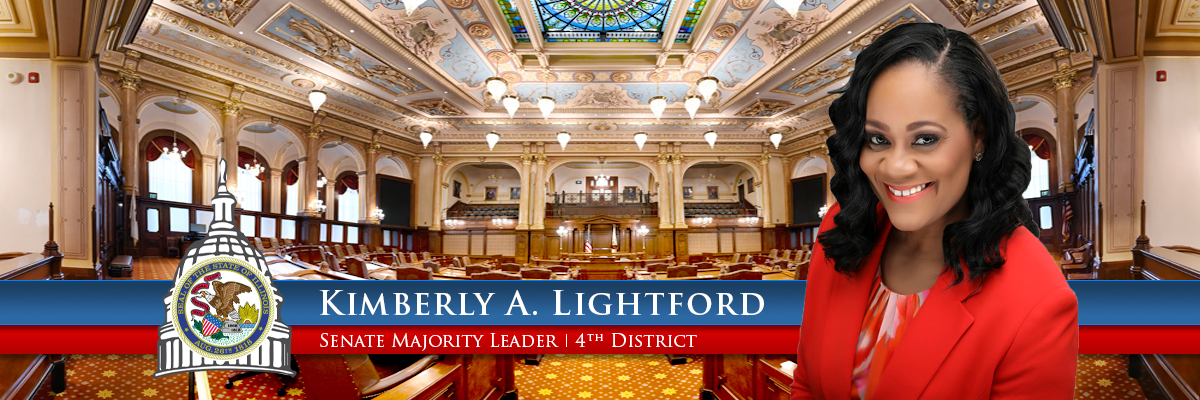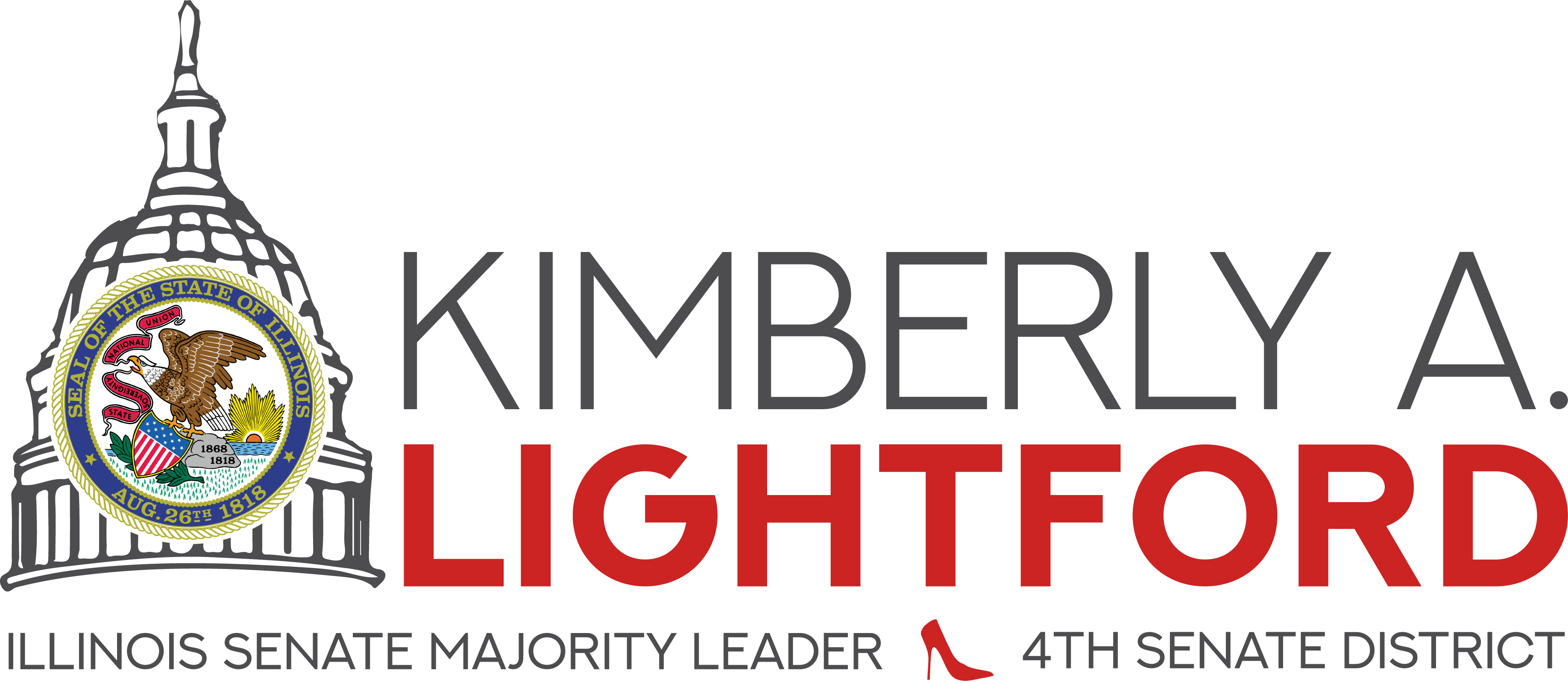- Details
- Category: News
 BROADVIEW – Senate Majority Leader Kimberly A. Lightford (D-Maywood) is celebrating Illinois’ next minimum wage increase and reminding employees to double check their paychecks after Jan. 1. The minimum wage will increase to $11 an hour on New Year’s Day.
BROADVIEW – Senate Majority Leader Kimberly A. Lightford (D-Maywood) is celebrating Illinois’ next minimum wage increase and reminding employees to double check their paychecks after Jan. 1. The minimum wage will increase to $11 an hour on New Year’s Day.
“Even before the pandemic, many working families were struggling,” said Lightford, chief sponsor of the 2019 law raising the minimum wage. “This increase won’t solve all of their problems, but it will surely help.”
The current state minimum wage is $10 an hour, up from $8.25 in 2019. Lightford is also responsible for the 2003 and 2006 laws that gradually increased the minimum wage from $5.15 to $8.25 per hour.
This increase is the third in a series of wage adjustments required by Public Act 101-1, which Lightford passed after years of hard work. The minimum wage will continue to increase by one dollar annually until it reaches $15 in 2025.
“Every year, the minimum wage goes up, and every year, employees need to check their paychecks after Jan. 1,” Lightford said. “Some employers may make honest mistakes, but don’t be afraid to report it if they don’t increase your pay.”
Employees who are not being paid at the proper rate can report their employers to the Illinois Department of Labor.
Cook County’s minimum wage is higher than the rest of the state’s at $13 for employers of four to 20 employees and $14 an hour for employers of 21 or more, a move that Lightford commends.
- Details
- Category: News
 BROADVIEW – Senate Majority Leader Kimberly A. Lightford (D-Maywood) and Broadview Mayor Katrina Thompson joined Proviso Leyden Council for Community Action and Black Men United for a food giveaway Monday.
BROADVIEW – Senate Majority Leader Kimberly A. Lightford (D-Maywood) and Broadview Mayor Katrina Thompson joined Proviso Leyden Council for Community Action and Black Men United for a food giveaway Monday.
“Food insecurity is at an all-time high, and we wanted to do our part to ensure our families are able to put a meal on their table this Thanksgiving,” Lightford said. “I am grateful to partner with Mayor Thompson, Proviso Leyden Council for Community Action and Black Men United for this important community event.”
Participants drove up to the parking lot of the Broadview Village Square Shopping Center where they received a box of food and information on veterans’ benefits, men’s health and energy assistance. One thousand boxes of food were distributed throughout the three hour event.
Additionally, as the holiday season quickly approaches, Lightford would like to remind people the importance of continuing to follow COVID-19 protocols.
“I continue to encourage everyone to stay home this Thanksgiving and find ways to celebrate with family virtually,” Lightford said. “I know people are getting restless, but we need to continue wearing our masks, washing our hands and keeping our distance to keep those we miss and love safe.”
- Details
- Category: News
 SPRINGFIELD - As Illinois sees an uptick in COVID-19 cases, the Illinois General Assembly has decided not to return to session next week, as previously scheduled, but will instead convene in January for a lame duck session. Senate Majority Leader Kimberly A. Lightford (D-Maywood) ensures that the change in the session schedule will not deter the Illinois Legislative Black Caucus’ efforts to rid Illinois of systemic racism.
SPRINGFIELD - As Illinois sees an uptick in COVID-19 cases, the Illinois General Assembly has decided not to return to session next week, as previously scheduled, but will instead convene in January for a lame duck session. Senate Majority Leader Kimberly A. Lightford (D-Maywood) ensures that the change in the session schedule will not deter the Illinois Legislative Black Caucus’ efforts to rid Illinois of systemic racism.
“We are still in the midst of a pandemic, and COVID-19 cases are surging across the state, making the risk is too high to convene at this time,” said Lightford, chair of the ILBC. “While we will not be able to pass legislation as soon as we hoped, the urgency to bring an end to systemic racism remains.”
The Illinois Legislative Black Caucus launched four pillars of policy on Sept. 1 through which the caucus is identifying measures that will put Illinois on a course for racial and economic equity. Those pillars are:
I. Criminal justice reform, violence reduction and police accountability
II. Education and workforce development
III. Economic access, equity and opportunity
IV. Health care and human services
Since September, the Senate has hosted subject matter hearings on the four pillars in an effort to provide legislators and the public a deeper look into the Black experience in Illinois. The hearings, which wrap up this week, served as an opportunity to gather facts and recommendations to help address systemic issues that have directly or indirectly made the lives of Black and other marginalized communities in Illinois more difficult for centuries.
“The Black Caucus will continue with our mission to put an end to systemic racism in Illinois,” Lightford said. “The moment to put forth this critical agenda is now, and I know President Harmon and Speaker Madigan share our concerns and our commitment to making a difference.”
The General Assembly is expected to convene prior to the spring session.
- Details
- Category: News
 CHICAGO – Senate Majority Leader Kimberly A. Lightford (D-Maywood) joined the Senate Education and Higher Education Committees for a hearing focused on efforts to prepare Illinois youth to enter the workforce, including career and technical education (CTE) program, the Illinois Pathways program and the Illinois Postsecondary Workforce Readiness Act.
CHICAGO – Senate Majority Leader Kimberly A. Lightford (D-Maywood) joined the Senate Education and Higher Education Committees for a hearing focused on efforts to prepare Illinois youth to enter the workforce, including career and technical education (CTE) program, the Illinois Pathways program and the Illinois Postsecondary Workforce Readiness Act.
“With few or no work experience programs available in their communities, students can’t build the job readiness skills they’ll need to excel in the workforce after graduation,” Lightford said. “CTE programs are an essential part of preparing students for high-demand, skilled careers.”
More Articles …
- Lightford emphasizes the importance of student support services, developmental education and teacher recruitment
- Lightford looks to make college more affordable for Black and low income students
- Lightford pushes for early world language classes and mental health and recovery access
- Black Caucus: Systemic racism is killing Black people in Illinois
Page 30 of 129







